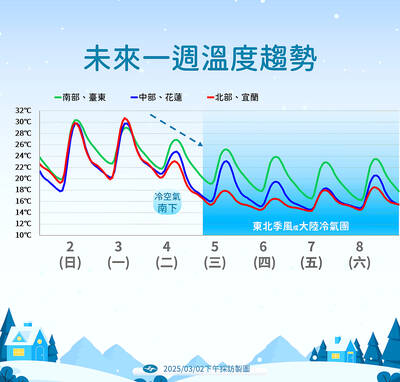South Korea’s won led currency gains in Asia this week as improved earnings and evidence the global economy is recovering from a recession bolstered demand for emerging-market assets.
The Bloomberg-JPMorgan Asia Dollar Index had its best week in almost two months as China and Singapore this week reported economic growth that beat analysts’ estimates. Indonesia’s rupiah fell, trimming the week’s advance, after two separate hotel explosions in Jakarta on Friday.
The New Taiwan dollar had its biggest weekly gain since May on speculation a rebound in global demand for personal computers will boost exports.
The NT dollar appreciated 0.3 percent this week to NT$32.955.
The Taiwanese currency touched an almost two-week high on optimism an end to the global recession will fuel demand for local exports. Electronics account for about two-fifths of Taiwan’s overseas sales and China is the biggest buyer.
“The market has gradually moved back into risk appetite,” said Callum Henderson, head of currency strategy at Standard Chartered Plc in Singapore. “US corporate earnings and Chinese GDP were above expectations, all of that is supportive for the balance in equities and supportive for assets.”
The won jumped 1.8 percent this week to 1,259.3 per US dollar in Seoul, according to data compiled by Bloomberg. Singapore’s dollar strengthened 0.8 percent to S$1.4515, while India’s rupee rose 0.5 percent to 48.74.
The Asia Dollar Index climbed 0.6 percent this week, the most since May 22, as China on Thursday said GDP increased 7.9 percent in the second quarter from a year earlier, exceeding the median 7.8 percent forecast in a Bloomberg survey. The MSCI Asia-Pacific Index of stocks advanced 2.9 percent, the most since the five-day period ended May 8.
The rupiah fell 0.5 percent on Friday to 10,175 a dollar, trimming the week’s gain to 0.2 percent. Malaysia’s ringgit traded little changed at 3.5680 after touching 3.5535 on Thursday, a one-week high.
Elsewhere, the Philippine peso climbed 0.5 percent this week to 48.075 per US dollar and the Thai baht was little changed at 34.07. China’s yuan traded at 6.8317 versus 6.8328 last Friday.
The US dollar and the yen posted the biggest declines against the euro since May as corporate earnings topped forecasts and US reports showing gains in housing and a slower decline in industrial production.
The Canadian dollar advanced to a one-month high against the greenback as crude oil rebounded.
The US currency fell 1.2 percent to US$1.4102 per euro on Friday, from US$1.3936 last Friday. The yen lost 3 percent to 132.85 per euro, from 129 a week earlier. The declines were the biggest since the five-day period ended May 22. The Japanese currency fell 1.8 percent to ¥94.19.
The Mexican peso rebounded from a two-and-a-half-month low, rising 2.6 percent this week to 13.34 per dollar.
The yen appreciated against 13 of 16 most actively traded currencies in the past month, rising 1 percent versus the Mexican peso. The yen is weaker against the entire group this year.
The Canadian dollar appreciated the most of the 16 major currencies against the yen this week, rising 6.4 percent to ¥84.60, as crude oil gained.

SECURITY: The purpose for giving Hong Kong and Macau residents more lenient paths to permanent residency no longer applies due to China’s policies, a source said The government is considering removing an optional path to citizenship for residents from Hong Kong and Macau, and lengthening the terms for permanent residence eligibility, a source said yesterday. In a bid to prevent the Chinese Communist Party (CCP) from infiltrating Taiwan through immigration from Hong Kong and Macau, the government could amend immigration laws for residents of the territories who currently receive preferential treatment, an official familiar with the matter speaking on condition of anonymity said. The move was part of “national security-related legislative reform,” they added. Under the amendments, arrivals from the Chinese territories would have to reside in Taiwan for

CRITICAL MOVE: TSMC’s plan to invest another US$100 billion in US chipmaking would boost Taiwan’s competitive edge in the global market, the premier said The government would ensure that the most advanced chipmaking technology stays in Taiwan while assisting Taiwan Semiconductor Manufacturing Co (TSMC, 台積電) in investing overseas, the Presidential Office said yesterday. The statement follows a joint announcement by the world’s largest contract chipmaker and US President Donald Trump on Monday that TSMC would invest an additional US$100 billion over the next four years to expand its semiconductor manufacturing operations in the US, which would include construction of three new chip fabrication plants, two advanced packaging facilities, and a research and development center. The government knew about the deal in advance and would assist, Presidential

‘DANGEROUS GAME’: Legislative Yuan budget cuts have already become a point of discussion for Democrats and Republicans in Washington, Elbridge Colby said Taiwan’s fall to China “would be a disaster for American interests” and Taipei must raise defense spending to deter Beijing, US President Donald Trump’s pick to lead Pentagon policy, Elbridge Colby, said on Tuesday during his US Senate confirmation hearing. The nominee for US undersecretary of defense for policy told the Armed Services Committee that Washington needs to motivate Taiwan to avoid a conflict with China and that he is “profoundly disturbed” about its perceived reluctance to raise defense spending closer to 10 percent of GDP. Colby, a China hawk who also served in the Pentagon in Trump’s first team,

The arrival of a cold front tomorrow could plunge temperatures into the mid-teens, the Central Weather Administration (CWA) said. Temperatures yesterday rose to 28°C to 30°C in northern and eastern Taiwan, and 32°C to 33°C in central and southern Taiwan, CWA data showed. Similar but mostly cloudy weather is expected today, the CWA said. However, the arrival of a cold air mass tomorrow would cause a rapid drop in temperatures to 15°C cooler than the previous day’s highs. The cold front, which is expected to last through the weekend, would bring steady rainfall tomorrow, along with multiple waves of showers